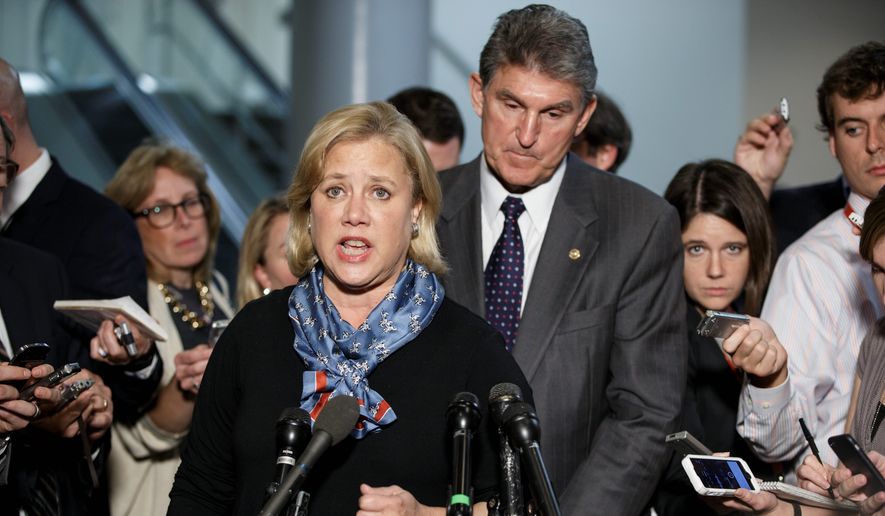OPINION:
After the thrashing Barack Obama and his party got in last week’s elections, it is now clear that the Democrats are leaderless and in disarray, and he is no longer relevant in the domestic-policy battles of his last two years in office.
The Republican-run House and Democratic Senate now plan to vote to bypass President Obama’s stubborn opposition to the Keystone XL pipeline. That would be seen as a stunning, bipartisan rebuke of the president’s failed energy policies.
Leading the charge for the oil pipeline is the politically embattled Sen. Mary L. Landrieu, Louisiana Democrat, who is being forced into a runoff against Republican Rep. Bill Cassidy. Nearly a dozen Democrats support her demand for a vote, along with the entire Senate GOP caucus, to complete the pipeline.
“The project would bring billions of barrels of western Canadian oil to Gulf ports and refineries and create thousands of high-paying jobs,” says University of Maryland business economist Peter Morici.
Meantime, one of the key architects of Obamacare, the president’s signature legislative achievement, is quoted as saying that Democrats used a deceptive strategy to hide details of the law in order to get it through Congress.
“Lack of transparency is a huge political advantage,” said economist Jonathan Gruber, who helped shape the health care law. “And basically, call it the ’stupidity of the American voter’ or whatever, but basically that was really, really critical to getting the thing to pass.”
Mr. Gruber’s remarks, made last year in a videotaped panel discussion at the University of Pennsylvania, has ignited a political firestorm that went viral on the Internet, giving the GOP new ammunition in their war to repeal Obamacare and replace it with a scaled-down health care reform bill of their own.
Mr. Gruber has since said his remarks were “off the cuff” and inappropriate, but he did not recant them. In 2009, when Mr. Obama and the Democrats were promising voters that their bill would lower health care costs, Mr. Gruber said that the legislation “really doesn’t bend the cost curve.”
“The strategy was to hide the truth from the American people,” said Sen. Jeff Sessions, Alabama Republican, who will chair the Senate Budget Committee next year.
Republicans have demanded investigative hearings on the Democrats’ shady legislative strategy and said Mr. Gruber will be called to testify about his critical remarks.
Obamacare is already running into trouble over whether the system faces insolvency if far fewer people — especially younger, healthier adults — sign up for coverage.
The administration estimated Monday that the number of Americans covered by the Affordable Care Act is going to be significantly below its earlier estimates by the end of this year.
Of the 8 million who enrolled last spring, only about 7 million remained signed up by mid-October. Many had stopped paying their premiums, and 112,000 or more immigrants lost coverage because they couldn’t prove they were eligible.
Obamacare faces an even more serious challenge from the U.S. Supreme Court, which just announced it will re-examine the program’s subsidies to determine if they pass constitutional muster.
Yet Mr. Obama continues to make exaggerated claims for his health care law, as he did last week at a White House news conference. “Health care inflation has gone down every single year since the law was passed,” he said.
Washington Post fact checker Glenn Kessler gave him three Pinocchios for that remark, saying “the impact of his health-care law remains unclear.”
Elsewhere, the president is under fire from a Democrat in his own administration over regulatory policy.
Just a few hours after Mr. Obama had called on the Federal Communications Commission to approve sweeping new regulations on high-speed Internet providers, the head of the FCC rejected his approach — saying he preferred a softer approach than the strict regulations the president wants.
“What you want is what everyone wants: an open Internet that doesn’t affect your business,” FCC Chairman Tom Wheeler, appointed by Mr. Obama, told a meeting of top officials representing the nation’s biggest Web companies.
As if to remind Mr. Obama, who still thinks he is master of the universe, Mr. Wheeler repeatedly told the corporate bigwigs that the FCC is one of a select group of government agencies that takes no orders from the White House.
“I am an independent agency,” he said, “and ultimately this decision is [ours] alone.”
There were two other major deals that dominated the president’s agenda during his trip to an economic summit in Beijing this week that spoke volumes about Mr. Obama’s disappearing relevance on the international stage.
One was the sweeping climate-change agreement with China to cap carbon emissions that was repudiated by incoming Republican Majority Leader Mitch McConnell as a job-killing deal that will hurt the U.S. economy.
Needless to say, this agreement is going nowhere next year in the Republican-controlled Congress, which is focused like a laser beam on restricting the Environmental Protection Agency’s rule-making authority.
The other deal Mr. Obama was hoping to promote at the Asia-Pacific Economic Cooperation summit was his Trans-Pacific Partnership free-trade agreement.
Negotiations over TPP collapsed, though, in large part owing to fierce political opposition at home from his party’s labor bosses and the Democrats, but also because Mr. Obama has given free-trade deals little more than lip service during his presidency. He is no longer seen as a serious negotiator on the world stage.
Democrats may still be in charge of the Senate in the lame-duck Congress for the rest of this year, but the GOP is already flexing its political muscles on Capitol Hill. Mr. Obama has clearly lost his power base for the remainder of his presidency.
Donald Lambro is a syndicated columnist and contributor to The Washington Times.




Please read our comment policy before commenting.